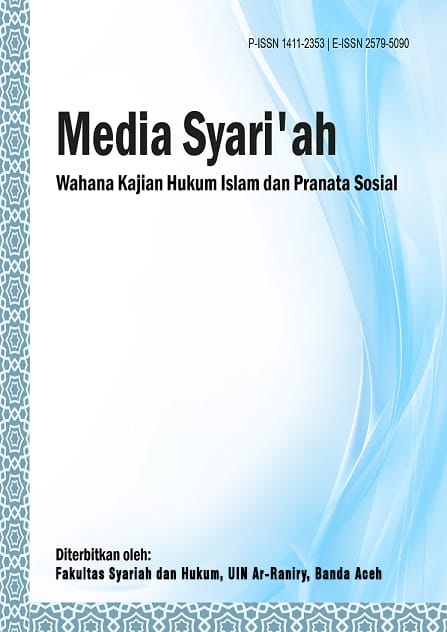Pembuktian dalam Cerai Ta’liq Talak (Studi Implementasi Pasal 50 Enakmen No.5 Tahun 2004 Di Mahkamah Rendah Syariah Balik Pulau, Pulau Pinang)
DOI:
https://doi.org/10.22373/jms.v20i1.6499Keywords:
Pembuktian, Cerai Ta’liq Talak.Abstract
Cerai ta’liq merupakan satu kaedah perceraian yang telah dibincangkan oleh para ulama sejak sekian lamanya. Cerai ta’liq adalah suatu bentuk penceraian sering dilakukan di Negara Malaysia. Kaedah perceraian ini akan berlaku setelah syarat yang terkandung dalam lafaz ta’liq yang diucapkan oleh suami itu, kemudian terjadi. Tujuan ta’liq talak untuk membela nasib wanita daripada ditindas dan dizalimi oleh suami terutama dalam kasus pengabaian nafkah, mencederakan dan meninggalkan istri dalam tempoh yang agak lama. Hal ini bertepatan dengan implikasi ta’liq memberi kesan besar yaitu perceraian apabila syarat ta’liq tersebut telah berlaku. Seorang istri berhak mendapatkan perceraian ta’liq apabila terbukti suami tersebut telah melanggar perjanjian ta’liq talak sebagai yang diatur dalam Undang-undang Keluarga Islam Negeri Pulau Pinang No. 5 Tahun 2004. Istri harus mengajukan permohonan tersebut di Mahkamah Rendah Syariah untuk menyelesaikan kasus itu. Tujuan penelitian ini, untuk mengetahui prosedur pembuktian dalam cerai ta’liq talak dalam beberapa kasus yang berada di Mahkamah Rendah Syariah Balik Pulau, Pulau Pinang. Dalam pembahasan skripsi ini, penulis menggunakan penelitian yuridis empiris yaitu data primer dan data sekunder. Data primer diperoleh dari penelitian lapangan yaitu wawancara. Data sekunder diperoleh dari riset dan pustaka dianalisis dengan diskriptif analisis. Ditemukan bahwa pembuktian serta prosedur ta’liq talak dari awal penyelenggaraan pendaftaran sehingga mendapat keputusan daripada mahkamah itu hampir sama dengan perceraian secara biasa dan tidak ada perbedaannya. Saranan yang sesuai untuk dipraktikan berdasarkan pemerhatian adalah membuat suatu perjanjian mengenai pemilikkan harta benda bersama suami istri selama perkawinan dan menegaskan lagi hukum dan denda kepada suami yang menzalimi istrinya.
Ta’liq talak is a method of divorce that has been discussed by scholars for many years. A divorce is a form of frequent enlightenment in the state of Malaysia. This method of divorce will take place after the condition contained in the Ta'liq spoken by the husband, then occurs. The purpose of Ta'liq Talak to defend the fate of women rather than be suppressed and wronged by the husband, especially in the case of a living abandonment, injure and leave the wife in a relatively long period. This coincides with the implications of Ta'liq giving a big impression of divorce when the terms of the Ta'liq have occurred. A wife is entitled to a Ta'liq divorce when it is proven that the husband has violated the Treaty of Ta'liq Talak as stipulated in the law of the Islamic State of Penang No. 5 the year 2004. The wife must apply to the sharia lower court to settle the case. The purpose of this research is to know the verification procedure in divorce in some cases that are located at the lower court of Syariah Balik Pulau, Penang. In the discussion of this thesis, the authors used empirical research on the primary data and secondary data. Primary Data is obtained from the research field i.e. interviews. Secondary Data obtained from research and libraries are analyzed with a detailed analysis. It was found that the ta'liq talak proof and procedure from the beginning of the registration process so that the decision of the court was almost the same as the usual divorce and there was no difference. The appropriate suggestion to be practiced based on observation is to make a Treaty on the sorting of the property with husband and wife during marriage and reaffirm the law and fines to the husband who wronged his wife.
References
Al-San’ani, Subul al-Salam, Jilid. 4., Beirut: Dar al-Ma’rifah, 1996.
Amir Syarifuddin, Hukum Perkawinan Islam di Indonesia: Antara Fiqh Munakahat dan Undang-Undang Perkawinan, Indonesia : Kencana, 2006.
Diakses melalui http://www2.esyariah.gov.my/esyariah/mal/portalv1-/enakmen/State_Enact_Ori.nsf/b3ac9c218c8efdc4482568310022d8b3/e5f7743ba25d31af4825713900066b0b? Open Document pada tanggal 2 Disember 2018
Jabatan Kehakiman Syariah Malaysia, Carta Aliran Proses Perceraian Di Mahkamah Syariah.
Najibah Mohd Zin, Undang-Undang Keluarga (Islam), Jilid 14, Dewan Bahasa Dan Pustaka, Kuala Lumpur, 2007.
Downloads
Published
Issue
Section
License
MEDIA SYARI'AH: Wahana Kajian Hukum Islam dan Pranata Sosial has CC-BY-SA or an equivalent license as the optimal license for the publication, distribution, use, and reuse of scholarly work. Authors who publish with this journal agree to the following terms:
1. Authors retain copyright and grant the journal right of first publication with the work simultaneously licensed under a Creative Commons Attribution-ShareAlike 4.0 International License that allows others to share the work with an acknowledgment of the work's authorship and initial publication in this journal.
2. Authors are able to enter into separate, additional contractual arrangements for the non-exclusive distribution of the journal's published version of the work (e.g., post it to an institutional repository or publish it in a book), with an acknowledgment of its initial publication in this journal.
3. Authors are permitted and encouraged to post their work online (e.g., in institutional repositories or on their website) prior to and during the submission process, as it can lead to productive exchanges, as well as earlier and greater citation of published work (See The Effect of Open Access).
You are free to:
Share — copy and redistribute the material in any medium or format.
Adapt — remix, transform, and build upon the material for any purpose, even commercially.
The licensor cannot revoke these freedoms as long as you follow the license terms.
All papers published in MEDIA SYARI'AH: Wahana Kajian Hukum Islam dan Pranata Sosial are licensed under a Creative Commons Attribution-ShareAlike 4.0 International License.




.png)


.png)
.png)
.png)



